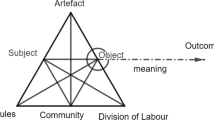Abstract
The study reported in this paper concerns the tensions and conflicts that teachers experience while they enact a new set of reform-oriented curricular materials into their classrooms. Our focus is οn the interactions developed in two groups of teachers in two schools for a period of a school year. We use Activity Theory to study emerging contradictions and we elaborate on the construct of dialectical opposition to understand the nature of these contradictions and their potential for teacher learning. We provide evidence that discussions about contradictions and their dialectical character in the two groups support teachers to engage differently in mathematics teaching and learning and carry potentials for shifts in the practices that evolve in their classrooms. Our study addresses empirically in the context of mathematics teaching the philosophical claim about the role of contradictions as a driving force for any dynamic system.



Similar content being viewed by others
References
Bliss, J., Monk, M., & Ogborn, J. (1983). Qualitative data analysis for educational research. London: Croom Helm.
Barab, S. A., Barnett, M., Yamagata-Lynch, L., Squire, K., & Keating, T. (2002). Using activity theory to understand the systemic tensions characterizing a technology-rich introductory astronomy course. Mind, Culture, and Activity, 9(2), 76–107.
Brown, M. (2009). The teacher–tool relationship: Theorizing the design and use of curriculum materials. In J. T. Remillard, B. Herbel-Eisenman, & G. Lloyd (Eds.), Mathematics teachers at work: Connecting curriculum materials and classroom instruction (pp. 17–36). New York, NY: Routledge.
Chapman, O., & Heater, B. (2010). Understanding change through a high school mathematics teacher’s journey to inquiry-based teaching. Journal of Mathematics Teacher Education, 13(6), 445–458.
Charmaz, K. (2006). Constructing grounded theory. A practical guide through qualitative analysis. London: Sage.
Choppin, J. (2011). Learned adaptations: Teachers’ understanding and use of curriculum resources. Journal of Mathematics Teacher Education, 14(5), 331–353.
Cole, M., & Engeström, Y. (1993). A cultural historical approach to distributed cognition. In G. Salomon (Ed.), Distributed cognitions: Psychological and educational considerations (pp. 1–46). Cambridge: Cambridge University Press.
Dey, I. (1999). Grounding grounded theory. Guidelines for qualitative inquiry. Bingley, UK: Emerald Group Publishing.
Engeström, Y. (2001). Expansive learning at work: Toward an activity theoretical reconceptualization. Journal of Education and Work, 14(1), 133–156.
Engeström, Y., Engeström, R., & Suntio, A. (2002). Can a school community learn to master its own future? An activity‐theoretical study of expansive learning among middle school teachers. In G. Wells & G. Claxton (Eds.), Learning for life in the 21st century (pp. 211–224). Oxford: Blackwell.
Fischbein, E. (1987). Intuition in science and mathematics: An educational approach. Dordrecht: Reidel.
Goodchild, S., & Jaworski, B. (2005). Identifying contradictions in a teaching and learning development project. In H. L. Chick & J. L. Vincent (Eds.), Proceedings of the 29th Conference of the International Group for the Psychology of Mathematics Education (vol. 3, pp. 41–47). Melbourne, Australia: PME Program Committee.
Ilyenkov, E. V. (2009). The ideal in human activity. Pacifica: Marxists Internet Archive.
Jaworski, B., & Potari, D. (2009). Bridging the micro- and the macro-divide: Using an activity theory model to capture sociocultural complexity in mathematics teaching and its development. Educational Studies in Mathematics, 72(2), 219–236.
Leont’ev, A. N. (1978). Activity, consciousness and personality. Englewood Cliffs: Prentice Hall.
Lewis, C. C., Perry, R. R., & Hurd, J. (2009). Improving mathematics instruction through lesson study: A theoretical model and North American case. Journal of Mathematics Teacher Education, 12(4), 285–304.
Potari, D. (2013). The relationship of theory and practice in mathematics teacher professional development: An activity theory perspective. ZDM, 45(4), 507–519.
Potari, D., Sakonidis, H., Chatzigoula, R., & Manaridis, A. (2010). Teachers’ and researchers’ collaboration in analyzing mathematics teaching: A context for professional reflection and development. Journal of Mathematics Teacher Education, 13, 473–485.
Presmeg, N. (1992). Prototypes, metaphors, metonymies and imaginative rationality in high school mathematics. Educational Studies in Mathematics, 23, 595–610.
Remillard, J. (2005). Examining key concepts in research on teachers’ use of mathematics curricula. Review of Educational Research, 75(2), 211–246.
Remillard, J. T., & Bryans, M. B. (2004). Teachers’ orientations toward mathematics curriculum materials: Implications for teacher learning. Journal of Research in Mathematics Education, 35(5), 352–388.
Roth, W.-M. (2007). Emotion at work: A contribution to third-generation cultural historical activity theory. Mind, Culture, and Activity, 14, 240–255.
Roth, W.-M., & Radford, L. (2011). A cultural-historical perspective on mathematics teaching and learning. Rotterdam: Sense Publishers.
Sakonidis, C., & Potari, D. (2014). Mathematics teacher educators’/researchers’ collaboration with teachers as a context for professional learning. ZDM, 46(2), 293–304.
Sfard, A. (1991). On the dual nature of mathematical conceptions: Reflections on processes and objects as different sides of the same coin. Educational Studies in Mathematics, 22, 1–36.
Sfard, A. (2008). Thinking as communicating. Cambridge: Cambridge University Press.
Skott, J. (2001). The emerging practices of a novice teacher: The roles of his school mathematics images. Journal of Mathematics Teacher Education, 4(1), 3–28.
Skott, J. (2004). The forced autonomy of mathematics teachers. Educational Studies in Mathematics, 56, 227–257.
Skott, J. (2009). Contextualising the notion of belief enactment. Journal of Mathematics Teacher Education, 12(1), 27–46. doi:10.1007/s10857-008-9093-9.
Steiner, H. G. (1985). Theory of mathematics education (TME): An introduction. For the Learning of Mathematics, 5(2), 11–17.
Stouraitis, K. (2016). Decision making in the context of enacting a new curriculum: an activity theoretical perspective. In C. Csíkos, A. Rausch, & J. Szitányi (Eds.), Proceedings of the 40th conference of the International Group for the Psychology of Mathematics Education (vol. 4, pp. 235–242). Szeged: PME.
Yamagata-Lynch, L. C., & Haudenschild, M. T. (2009). Using activity systems analysis to identify inner contradictions in teacher professional development. Teaching and Teacher Education, 25(3), 507–517.
Author information
Authors and Affiliations
Corresponding author
Rights and permissions
About this article
Cite this article
Stouraitis, K., Potari, D. & Skott, J. Contradictions, dialectical oppositions and shifts in teaching mathematics. Educ Stud Math 95, 203–217 (2017). https://doi.org/10.1007/s10649-017-9749-4
Published:
Issue Date:
DOI: https://doi.org/10.1007/s10649-017-9749-4




